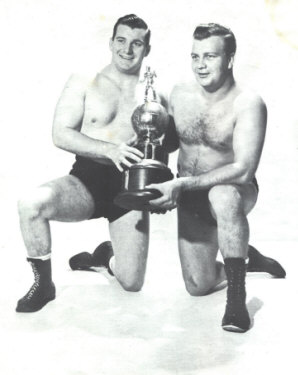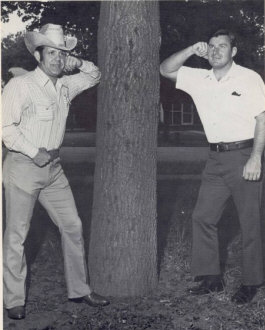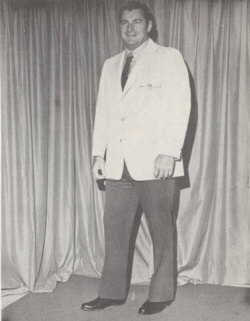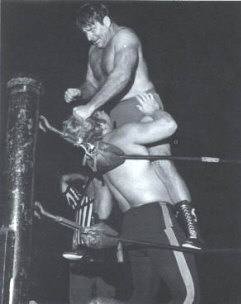|
David Chappell: Sandy,
thanks so much for speaking with
the Mid-Atlantic Gateway this
afternoon. We’ve been wanting to
do this for a long time!
Sandy Scott: I’m happy to
be here with you guys.
Chappell: I guess a good
place to start is to ask you how
you broke into the wrestling
business.
Scott: I broke in
1954…1955. I was in Hamilton,
Ontario Canada. My brother
[George Scott] already had six
years in pro wrestling.
Chappell: Where was
George in the early days?
Scott: He was on the
road. He was in Toledo, Ohio. He
went from Toledo, Ohio up to
Calgary, Alberta.
And I got a call in 1955 from
[George]. I was wrestling at the
time, and I also had a job at
Westinghouse.
Chappell: What were you
doing at Westinghouse?
Scott: I was a
brakeman…on their railroad.
Chappell: Interesting…
Scott: And at that time I
got a call from my brother. He
said, “How would you like to
come up to Calgary and team up?”
Chappell: What was your
response?
Scott: Well, I said, ‘You
know, I’m working here and I’m
wrestling three/four times a
week.’ He said, “Come on out
here and we’ll team up and see
what we can do.” And I said,
‘Okay!’
Chappell: And the Flying
Scott Brothers were born!
Scott: Yes! So, I packed
my suitcase and went on out to
Calgary, Alberta…where we stayed
for about six years.Then we got a call from Jim
Crockett Promotions, and they
wanted us to come down to that
territory.
Chappell: About what year
was that?
Scott: That would have
been 1960-1961. We came on down
to Jim Crockett Promotions.

Chappell: Who were the
big stars in the Crockett
territory when you and George
first arrived in the area?
Scott: At that time,
there was George Becker and Dick
Steinborn. And then Johnny
Weaver came in after Steinborn
left. Johnny of course became
George Becker’s partner.
Chappell: And what a team
Becker and Weaver were!
Scott: Oh, yes! And at
that time George [Scott] and I
and Becker and Weaver were the
top (babyface) teams.
Chappell: Who were the
top bad guy teams at that point
in time?
Scott: You had (Aldo)
Bogni and (Bronco) Lubich. And
(Rip) Hawk and (Swede) Hanson.
And then you had the Infernos.
Bourne: The Bolos?
Scott: Bolo…I think it
was Bolo and Larry Hamilton.
Going up into the 60s you had
the Hines’, and Ali Bey was in
for awhile.
In those early days George and I
were able to establish ourselves
as a top team in the Carolinas.
Bourne: When I was
recently researching some
newspaper clippings, I learned
that you all were not only a
very successful team but you
were also a successful singles
wrestler. Particularly in the
mid 1960s…you had bouts with the
likes of Gene Kiniski and Lou
Thesz. You had quite a singles
career.
Scott: I did. I wrestled
[Lou] Thesz in Raleigh, North
Carolina around that time. He
had just come out of Detroit,
where he wrestled a bald guy
named Brute Bernard!
Chappell: (laughing)
Bernard and Murphy were another
great team of that era.
Scott: Yeah, very much
so. After the match, Joe
Murnick, who was the promoter in
Richmond, came into the back and
said Thesz had three cracked
ribs.
Bourne: You cracked them
in the match?
Scott: No, Joe told me
that Brute cracked them up in
Detroit!
During the second fall of that
match in Raleigh, I had Thesz in
the abdominal stretch for a very
long time. I told Joe Murnick,
‘I’ll be a son of a gun, I said
this guy is in there like
nothing ever happened!’ And Joe
said, “That’s why he’s a
champion.”
Chappell: Amazing story!
Scott: Another real tough
guy was Bob Orton, Sr.
Bourne: Yes…I saw some
clippings of you and Orton in
singles matches.
Scott: Bob Orton was a
real tough guy. You had to be a
defensive wrestler with Orton,
because he’d really come after
you!
But I respected the guy, and I
guess he respected me, and we
had great matches out there. I
wrestled him for the [Southern
Heavyweight] belt. Yeah, I had a
lot of respect for him.
Do you all remember P.Y. Chung?
Chappell: Another great
villain of the 1960s!
Scott: Yeah, I had some
good matches with him. He came
out of Tennessee, and when he
came into the North Carolina
area, he was gonna run away with
everybody! He was gonna beat
everybody, like he did in
Tennessee.
Chappell/Bourne: (laughs)
Scott: I had a match with
him in Charlotte, North Carolina
that I remember. He had a very
heavy handed chop, and he would
come up to you with that chop.
And I had watched some of his
matches earlier, so I knew what
to expect from this guy.
So, we went on in there, and he
shot me into the ropes, and I
came off, and he was gonna give
me that chop…and I went up to
him with a dropkick!
Chappell/Bourne:
(laughing)
Scott: It busted his
nose, and down he went! Jumped
on him…one, two, three. He went
to Crockett and said, “This
ain’t for me.” And he left the
territory!
Bourne: During this time
frame, who was booking the
territory?
Scott: George Becker.
Chappell: Becker was a
tag team wrestler, and certainly
the territory revolved around
tag teams in the 60s.
Scott: It was a tag team
territory in the 1960s and the
first part of the 70s. And then
they switched off to having
singles matches as main events,
and the semi-finals would be tag
matches. That became the set up.
In 1972-73 I believe we went to
Australia on a tour, and that’s
around the time the switch away
from tag teams was occurring.
Bourne: Your brother
George finished his in-ring
career about that time?
Scott: Yes, George got
hurt…hurt his neck.
Bourne: In that 1973 time
frame, you were teaming with
Jerry Brisco and Nelson Royal.
Scott: Young Brisco,
Jerry Brisco…he was a hell of a
wrestler.
Chappell: Without a
doubt.
Scott: Not all that long
after George got hurt, Jimmy
(Crockett) called me into the
office and said he was going to
team me up with Brisco.
Brisco was some wrestler. I
remember one time teaming with
him against a Russian from
Buffalo by the name of
Mulkovich. We were on Raleigh
TV, and Mulkovich was just
tearing him up. He came over to
the corner, and I said, ‘Jerry,
you’re a hell of an amateur
wrestler, and this guy doesn’t
know it. Take him down and keep
him down!’ And he did, and that
was the end of it!
Chappell/Bourne:
(laughing)
Scott: Both Jerry and
Jack were superb amateur
wrestlers.
Chappell: Jerry was a
regular in the territory in the
early 70s, and Jack was in and
out at different times.
Scott: Jerry stayed in
there, I guess for a good year
and a half, maybe two years.
They teamed me with Jerry, and
later Thunderbolt Patterson came
in and teamed with Jerry. And then they
teamed me with Nelson Royal.

Nelson Royal and Sandy Scott,
circa 1973
Chappell: Nelson was
great.
Scott: Oh yeah. We could
both go, you know, if we had to
go. It was a great team…a great
team. We had a lot of good
battles.
Chappell: Which team gave
you and Nelson the best matches?
Scott: The top battles at
that time were with the
Andersons. I mean, I remember in
Greenville, South Carolina we
were selling out week after week
after week! Nelson and I were
very proud of all those
consecutive sellouts in
Greenville.
Chappell: What did you
think of the Anderson Brothers?
Scott: Now, the Andersons
I had a lot of respect for,
because those guys could
wrestle. They could really
wrestle!
Gene would come in there and try
to blow you up! In other words,
get you tired, and get you into
a position where he controlled
you and had everything he
wanted. He tried, but he
couldn’t do it with us! (laughs) He’d get so damn
aggravated with us that he’d
slap Ole’s hand off when he
tagged out! And Ole would come
in, and away we’d go…
Chappell/Bourne:
(laughing)
Scott: The Andersons were
a superb team. They weren’t like
any other team.
Chappell: How so?
Scott: They would hold
you to the break of three and a
half. The referee would give a
four count…and they would break
just a fraction before the
fourth. And they would be right
into you again!
Chappell: No rest for the
weary with Gene and Ole!
Scott: That’s right! They
were a super team. I really
enjoyed wrestling them.
Bourne: Who were some of
the other wrestlers that you
really enjoyed being in the ring
with…working with?
Scott: In addition to the
Andersons…Hawk and Hanson,
except on a Friday night!
Chappell/Bourne:
(laughing)
Scott: They came out of
Norfolk on Thursday, and it was
murder over in Richmond or
Lynchburg on Friday! Fighting
for your life!
Chappell/Bourne:
(laughing)
Scott: Another team that
I really enjoyed being in there
with was Boris Malenko and Bob
Orton. In Richmond, we had a
number of consecutive sellouts
with them. Up to the very last
one, where Malenko got
knifed…and Orton got his head
split open by the fans.
Chappell: The infamous
riot at the Richmond
Fairgrounds.
Scott: That was it!
Chappell: When we
interviewed Bill Eadie, he was
telling us that many years later
when Malenko managed him,
Malenko still had flashbacks
about that night.
Scott: I could understand
that he would! The guy got him
bad with a knife.
That was a funny situation. We
beat them two straight (falls).
As I turned to get out of the
ring, Malenko rushed me and shot
me into the pole, and that was
it. The fans went into the ring
and went after them.
Bourne: Wow...
Scott: Yeah…they got the
heat back…and boom!
Chappell: Apparently a
little too much heat!
Scott/Bourne: (laughing)
Bourne: I’m not knocking
today’s wrestling product, but
if they come to Greensboro once
or twice a year and draw a half
house, they’re happy. You guys
often sold out…on a weekly
basis.
Scott: Selling ‘em out!
Bourne: That was fan
support.
Scott: Well, I think the
problem today is that the fans
can’t get to the wrestlers. Or
the wrestlers don’t want to get
to the fans. I don’t know what
it is…but they don’t. And…we
did.
Chappell: There was
certainly great fan interaction
during the Mid-Atlantic days!

Scott: We talked to the
fans, and we mingled with them.
We signed autographs. We did
everything that we could.
It was almost like a family. I
mean, those places would be sold
out before we ever got there.
Chappell: Same faces on
the front row every week!
Scott: Yeah! Oh yeah,
week in and week out. It was
like hockey…you can’t get a
hockey ticket in Toronto for ten
years because of the Molson’s
and all the companies that
bought them out. But when they
started losing and the people
were staying away, yeah you can
buy tickets. But we never had
that problem!
Bourne: I've been told that in Greensboro
when they picked up tickets for
a show, they went ahead and paid
for the next show. That
guaranteed them the same seats.
Then their kids got them after
they left.
Scott: Dick, you
mentioned Greensboro. Greensboro
was a superb town. We had the
biggest, biggest house they ever
had in Greensboro. We had them
lined up for miles and miles. In
fact, the state police came in
and said we had to do something
about it! It was unbelievable in those
days!
Chappell: Like you said
before Sandy, you all treated
the fans right.
Scott: We always took
time to go out and talk to the
fans.
Bourne: Greensboro seemed
to have the biggest shows, and a
lot of stars were brought in
from other areas to appear on
the Greensboro shows.
Scott: That’s right. And
those kinds of shows worked up
to the closed circuit, satellite
and pay per views years later.
Crockett gave Greensboro a huge
Thanksgiving Day show every
year. It was something! Then
Dusty Rhodes convinced Crockett
to move it out late in the
1980s. I told them then that was
a big mistake.
Bourne: And you were
proven right.
Chappell: Yeah, that just
killed Greensboro.
Scott: David, the fans
there expected the show. We’d
done it for years.
Bourne: Sandy, going back
to the early 70s there was a big
change in booking the Crockett
territory. Your brother George
came in and booked.
Scott: Yeah, he came in
from Texas.
Chappell: This was around
the time when Jim Crockett, Sr.
died.
Scott: And John Ringley
took over for a while. Ringley
didn’t understand wrestling. He
understood rock and roll, the
Globetrotters and things like
that. When Jim Crockett, Sr.
died, Mrs. Crockett I guess
moved him into the wrestling
area to keep that going. But he did a terrible job. But
he did bring George in to do the
booking.
Chappell: Describe
George’s early days as booker.
Scott: George said he had
to have a free hand to do the
job, and Ringley said, “Yeah, go
ahead.”
Chappell: Who did George
replace as booker?
Scott: At that time, I
believe the bookers were Hawk
and Weaver.
Chappell: Who were some
of the new talent George brought
in?
Scott: He brought in
Wahoo McDaniel and Johnny
Valentine…(Super Destroyer) Don
Jardine. Later, he brought in
Blackjack Mulligan…
Bourne: Blackjack
Mulligan had told us that the
guys George brought in were sort
of in a clique…the Texas guys.
Scott: Yes, and the
reason was those guys had proven
themselves in Texas. So, he knew
they could do it in the
Carolinas as well. You bring in people that are
proven…that can do it.
Chappell: A lot of people
forget that the territory didn’t
pop immediately upon George’s
arrival as booker.
Scott: George told me at
that time that it would take a
year to get the territory back
to life. And it did. It took a
year to get it back.
And then we did great for years.
Flair, Mulligan, Wahoo,
Valentine…we had the cream of
the crop.
CONTINUED IN PART 2

Sandy Scott battles Bill White
in Charlotte.
|